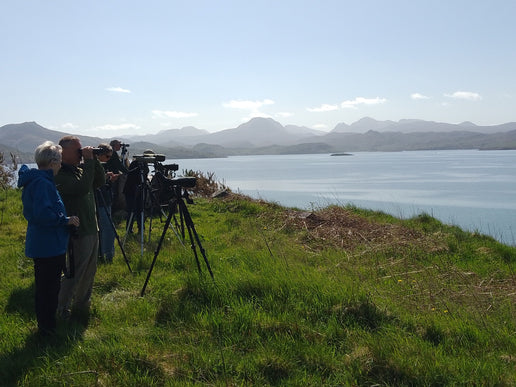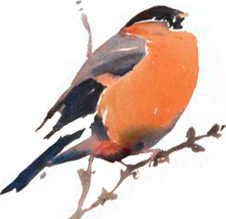We regret that bookings are now closed. If you're keen to come along, please email Katie Berry mail@the-soc.org.uk and she will advise if there are any spaces available.
We're delighted to announce that the 2025 SOC Annual Conference and AGM will be held on Saturday 22 November at Kilmardinny House, Bearsden, Glasgow, G61 3NN. This year's theme is Scotland for Birds: Opportunities for Positive Change, with the Conference being held as a one day event, and optional outings on Sunday.
The price is £60 for members, £90 non-members, and £30 for students/under-18s. If the full cost would be a barrier to you attending, please contact us by email and we will be happy to discuss a reduced rate.
In addition, we are thrilled to announce that SOC's Clyde Branch will offer additional funding to local young people with a passion for birds and nature. Helping these enthusiasts to join the Conference is a key part of the SOC’s efforts to cultivate a robust population of young naturalists to record, conserve, and advocate for birds across Scotland. For further information and details on how to apply, please see our News post. Please note that the deadline for applications is 29 October at 5pm.
There will also be the option to join us for a light buffet dinner and a chance to network with other delegates at the nearby Burnbrae Pub, Milngavie Road, Bearsden, Glasgow, G61 3DQ. Dinner is priced at £13per person, or free for those on the Student/under 18 rate (sponsored by SLR Consulting)*.
*Please note that under 18s are permitted entry to the Pub, however you will need to vacate the premises by 10pm due to licensing restrictions.
SOC's Clyde branch will be offering a range of local outings on the Sunday, including Ardmore, Hogganfield, RSPB Baron's Haugh and RSPB Lochwinnoch. There will be the opportunity to find out more about the walks and locations, and sign up to your preferred excursion, at the Clyde branch exhibitor table (at the Conference on Saturday).
Bookings
We regret that bookings are now closed. If you're keen to come along, please email Katie Berry mail@the-soc.org.uk and she will advise if there are any spaces available.
Programme
0915-0945
Registration and tea/coffee
0945
Welcome and introduction - Ruth Briggs, SOC President
1000
Bird conservation in a changing climate - Dr James Pearce-Higgins, Director of Science, BTO
1045
Tea/coffee
1115
The changing status of some rare bird species in Scotland: increases and colonisations - Dr Chris McInerny, University of Glasgow
1150
Museum bird collections: a time capsule with hidden treasures - Martin Stervander, Senior Curator of Birds, National Museums Scotland
1230
Lunch
1330
AGM and presentation of awards
1415
At the edge - Peter Cairns, independent commentator on rewilding and wildlife coexistence
1500
Tea/coffee
1530
Spotlight talks:
- Impact based predator intervention for ground nesting birds: value, context and implementation - Dr Jack Bamber, Lecturer, University of Aberdeen
- Recent and potential future changes of rare breeding birds in Scotland – Faezeh Fatemizadeh, 1st year PhD candidate, Durham University
- The Corn Bunting in Fife - Tom Beckett, Master's student, Durham University
- The bigger picture of youth engagement - Katie Monk, Student, University of St Andrews
- Panel Discussion around the bigger picture of youth engagement
1700
Raffle draw (tickets available from the SOC stand throughout the day)
1710
Summing up
1715
Close of conference
Our speakers:
Dr Jack Bamber, Lecturer at University of Aberdeen
Ground-nesting forest birds are struggling almost universally across their ranges. While multiple factors are driving decline, one symptom which often raises conservation conflict is predation. In order to alleviate predation whilst reducing conservation conflicts, we require new innovative impact-based interventions that lower predation rates. One such tool has been evaluated for the Capercaillie-Pine Marten conflict in Scotland, "Diversionary Feeding". This presentation reflects on our need to be adaptive and willing to deploy new tools that suit current contexts, applying the results of this multi-pronged landscape-scale evaluation of diversionary feeding as a case study, whilst reflecting on the complexity of implementing new methods for old problems.
Jack Bamber is a conservation scientist, currently a lecturer at the University of Aberdeen, and formerly a PhD candidate at Aberdeen. As an early-career researcher, he is motivated by research into predator–prey dynamics and evidence-based solutions for conflict intervention. He has worked with a wide range of species from capercaillie and pine martens to jaguars and red squirrels.
Tom Beckett, Master's Student at Durham University
Tom's talk will focus on the recovery of Fife's Corn Buntings: a conservation success story involving collaboration between the RSPB, farmers, researchers, and citizen scientists.
Tom is a lifelong birdwatcher and keen hillwalker from Edinburgh. He recently graduated from the University of St Andrews with a BSc in Ecology and Conservation, and will be starting a Master's at Durham University in October. During his time in St Andrews, he was President of the student birding society and was involved in the Fife Corn Bunting Project during the completion of his final-year dissertation.
Peter Cairns, independent commentator on rewilding and wildlife coexistence
As sea eagles soar, beavers build, wildcats prowl and wild boar reclaim lost ground, At the Edge takes a deep dive into the tensions surrounding this wildlife comeback. Against a backdrop of stunning imagery, Peter Cairns unpacks the complex social and cultural forces that shape our relationship with wild nature.
As a photographer, writer, speaker and commentator, Peter Cairns has spent the last 30 years immersed in Scotland’s rewilding conversation. Peter has a special interest in human-wildlife relationships, a subject he has explored in numerous books, films and multimedia initiatives. In 2018, Peter founded the rewilding charity SCOTLAND: The Big Picture, serving as its Executive Director until recently.
Faezeh Fatemizadeh, 1st year PhD candidate at Durham University
Scotland is emerging as a haven for several colonising and rare breeding birds, with some species shifting northwards, consistent with climate-driven range expansion, and others showing more positive population trends here than elsewhere in Britain. By drawing together population trends and climate suitability projections, this talk will highlight Scotland’s opportunities for positive change in supporting rare breeding bird species, while emphasising the need to balance climate-driven opportunities with habitat management and conservation action.
Faezeh is a first year PhD student at Durham University. Working in collaboration with Natural England, her PhD research project seeks to understand the potential impacts of changes in climate and land use on rare breeding birds in Britain.
Dr Chris McInerny, Reader at University of Glasgow
The status of many species of birds in Scotland has changed during recorded history. Some were originally only rare visitors but subsequently increased in numbers with, in a few cases, breeding occurring. This talk will describe and consider some recent examples where species that just a few years ago were rare, but are now being seen more regularly and occasionally breeding. The possible reasons for these changes in Scottish status will be discussed.
Chris McInerny is a Reader at the University of Glasgow, where he researches cell division and its relevance to cancer. He was President of the SOC, the Glasgow Natural History Society and Chairman of Biological Recording in Scotland; and Secretary to the British Ornithologists’ Union Records Committee and the Scottish Birds Records Committee. Furthermore, he was a Lead Editor and author of The Birds of Scotland, author of The Amphibians and Reptiles of Scotland, and has published over 150 papers describing various aspects Scottish ornithology and natural history, with a particular fascination for Honey-buzzards and Adders. Chris was recently made a Fellow of the SOC for his contribution to Scottish ornithology.
Katie Monk, Student at University of St Andrews
What does the gold standard of youth engagement look like and why does it matter? Youth engagement should be more than just giving young people a seat at the table. The bigger picture is about real influence, helping to shape decisions and driving change. Too often it feels tokenistic, but when done well, incorporating a youth voice can bring creativity, energy, and urgency to challenges like the climate crisis and social justice. For this to happen, organisations need to trust young people, share resources, and give us space to lead.
Katie currently studies ecology and conservation at the University of St Andrews. She has volunteered on various youth panels across the years including RSPB, BTO and Cairngorms Connect helping to inspire younger generations to protect the environment. Recently, she completed a 107 day hike from Land's End to John o’ Groats raising funds for the Hebridean Whale and Dolphin Trust, affirming her love for anything outdoors. She is particularly enthusiastic about breaking down the stigma and barriers surrounding nature-based actions, and increasing the access to the outdoors.
James Pearce-Higgins, Director of Science, BTO
There is growing evidence of the impacts that climate change is having on the natural world. Some of Scotland's most iconic species, particularly seabirds and upland birds, are particularly threatened, whilst new species are arriving from further south. At the same time, there are significant changes to the wider context of conservation, whether increasing prioritisation of land-use for net zero or increasing interest in rewilding. In this talk, James will use a range of evidence to consider what this means for the future for bird conservation, and the future for birds in Scotland.
James has worked for the BTO for 15 years, and as Director of Science for 11. He provides strategic oversight of BTO science, which encompasses both monitoring and research, and has worked extensively on climate change. Prior to that, James worked in Scotland for RSPB for 11 years, leading a wide range of upland research projects.
Martin Stervander, Senior Curator of Birds, National Museums Scotland
Martin will share some of the magic of museum bird collections, showing how these biological archives can shed new light on our avifauna. Among other things, he will talk about the collections as the only archives of extinct birds - and how they may contribute to finding possibly extinct species in the wild. He will describe how the collections can act as warning bells for environmental problems or even reflect evolution on human timescales, and will give examples of some very unexpected findings, such as the world’s first record of a species. He will also talk about how we can all make the collections become an even better resource for current and future research.
Martin Wintersparv Stervander is a Swedish evolutionary biologist and ornithologist, specialising in speciation, flight loss, genomics and taxonomy. He earned his PhD at Lund University in 2015, and held a Swedish Research Council postdoctoral fellowship at the University of Oregon followed by a Marie Skłodowska Curie fellowship at the Natural History Museum, where he was briefly Senior Curator of Birds. He then took up the same post at National Museums Scotland in 2023. His research uses both fieldwork and “museomics” to investigate how traits such as flight loss evolve, how populations diverge, and how environmental and genomic factors shape biodiversity. Speciation and taxonomy are some favourite topics! Alongside research and curation, he is the Managing Editor of Ornis Svecica, a core team member of AviList, and an active promotor of diversity in science.
We are very grateful to SLR for sponsoring the young birders' dinner.














